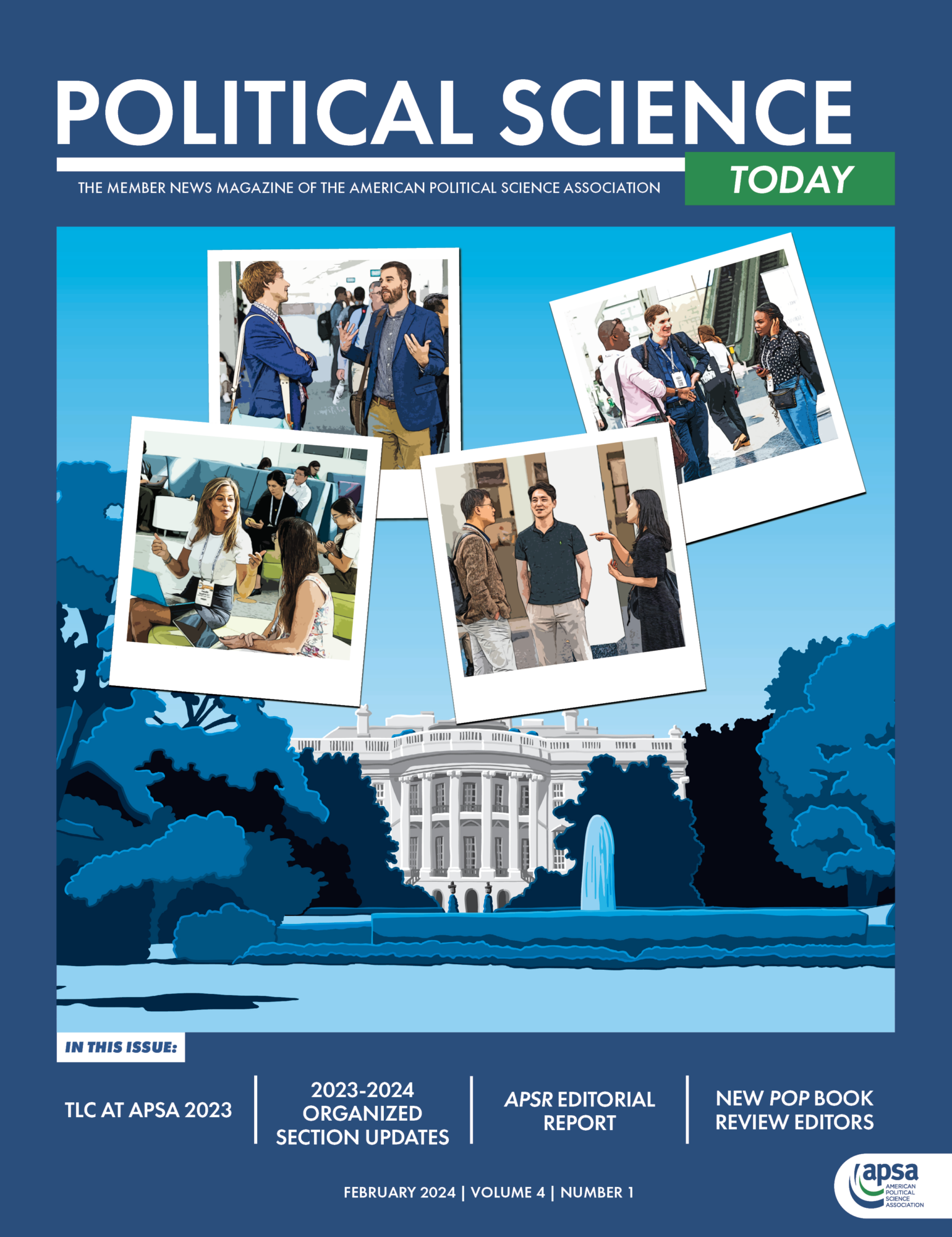Political Science Educator: volume 27, issue 1
As we end a busy spring semester, I would like to expand on my vision for the continued growth of the section. As I said in the last issue, I believe that our increasing diversity within the section—both personal and institutionally—is critical to our mission. I welcome suggestions on how to expand our efforts. To this end, I have already proposed to the Executive Committee that we amend our section bylaws to include a graduate student member of the Executive Committee, so that we can hear more clearly their concerns.
The Civic Initiatives Working Group (CIWG) within APSA led by J. Cherie Strachan (University of Akron) and Diana Owen (Georgetown University) has my support, along with the support of the Civic Engagement Section President, to convert the working group into a Standing Committee within APSA. The plan is to develop a more formal proposal with clear guidance for rotating section membership in the Standing Committee. This joint effort will also increase our visibility within APSA. The CIWG proposed three panels for the APSA Annual Meeting in Los Angeles. All three were accepted and are listed below:
- “Democracy Needs You! Advice for Launching Your Civic Engagement Research Agenda” (David Campbell, Amanda Wintersieck, J. Cherie Strachan, Diana Owen, Elizabeth A. Bennion, Katherine Robiadek)
- “Making It Count, Where to Submit your Applied Civic and Political Engagement Manuscripts” (Dick Simpson, Carah L. Ong Whaley, Allison McCartney, Elizabeth Matto, Joseph W. Roberts, John P. Forren)
- “Called to Service, Political Science Expertise and Civic Engagement Programming” (Bobbi Gentry, Karen M. Kedrowski, Jeremy Bowling, Mary McHugh, Judithanne Scourfield McLauchlan)
In our ongoing efforts to increase the visibility of the section within APSA more broadly, the section has entered into an agreement with Pi Sigma Alpha, the National Honor Society for Political Science, to sponsor the Craig L. Brians Award for Excellence in Undergraduate Research & Mentoring. As part of this sponsorship, the section was asked to provide a statement of its mission. After consulting with Terry Gilmore, we determined that it is the following: “promote exemplary undergraduate and graduate teaching within the political science discipline and the scholarship of teaching.” While this is certainly accurate, is it the inspiring and inclusive one that we need to move the Section forward? I am going to propose to the Executive Committee that we convene a small subcommittee of 5-7 people to evaluate the mission statement, and ask them to make recommendations for the section to discuss and adopt at the Section Business Meeting at the Annual Meeting in Los Angeles. For me, I think that a mission statement should be concise, outcome-oriented, and inclusive. Currently, ours meets two of those three criteria, but I would like to see us make it more inclusive and present an updated mission statement
As we prepare over the summer to catch up on the work that we have set aside while focused on our teaching, please consider attending the TLC at APSA conference in Los Angeles. Like the stand-alone TLC that was such a success in Baltimore in February, those who attend will have many opportunities to discuss with peers their teaching experiences and expectations, new pedagogies, and new opportunities or obstacles (like AI, for instance). For many of us, we prepare our classes somewhat in isolation, but TLC at APSA allows us to see that others are doing similar things and asking similar questions. I strongly encourage everyone to attend. There is so much to learn and so many interesting discussions to be had. Also, please consider sharing your assessments, discoveries, and new pedagogies with your peers in the Newsletter. I know that I find the Newsletter to be an invaluable resource.
Finally, as the summer begins, I would like to be the first to congratulate all members of the Section who have won (or rather, earned) a campus teaching award for the 2022-2023 academic year.
Best Wishes,
Joseph W. Roberts
—
Joseph W. Roberts is Chair and Professor of Politics and International Relations at Roger Williams University. He is also the president of the Political Science Education section of the American Political Science Association.
Published since 2005, The Political Science Educator is the newsletter of the Political Science Education Section of the American Political Science Association. All issues of the The Political Science Educator can be viewed on APSA Connects Civic Education page.
Editors: Colin Brown (Northeastern University), Matt Evans (Northwest Arkansas Community College)
Submissions: editor.PSE.newsletter@gmail.com
APSA Educate has republished The Political Science Educator since 2021. Any questions or corrections to how the newsletter appears on Educate should be addressed to educate@apsanet.org
Educate’s Political Science Educator digital collection





